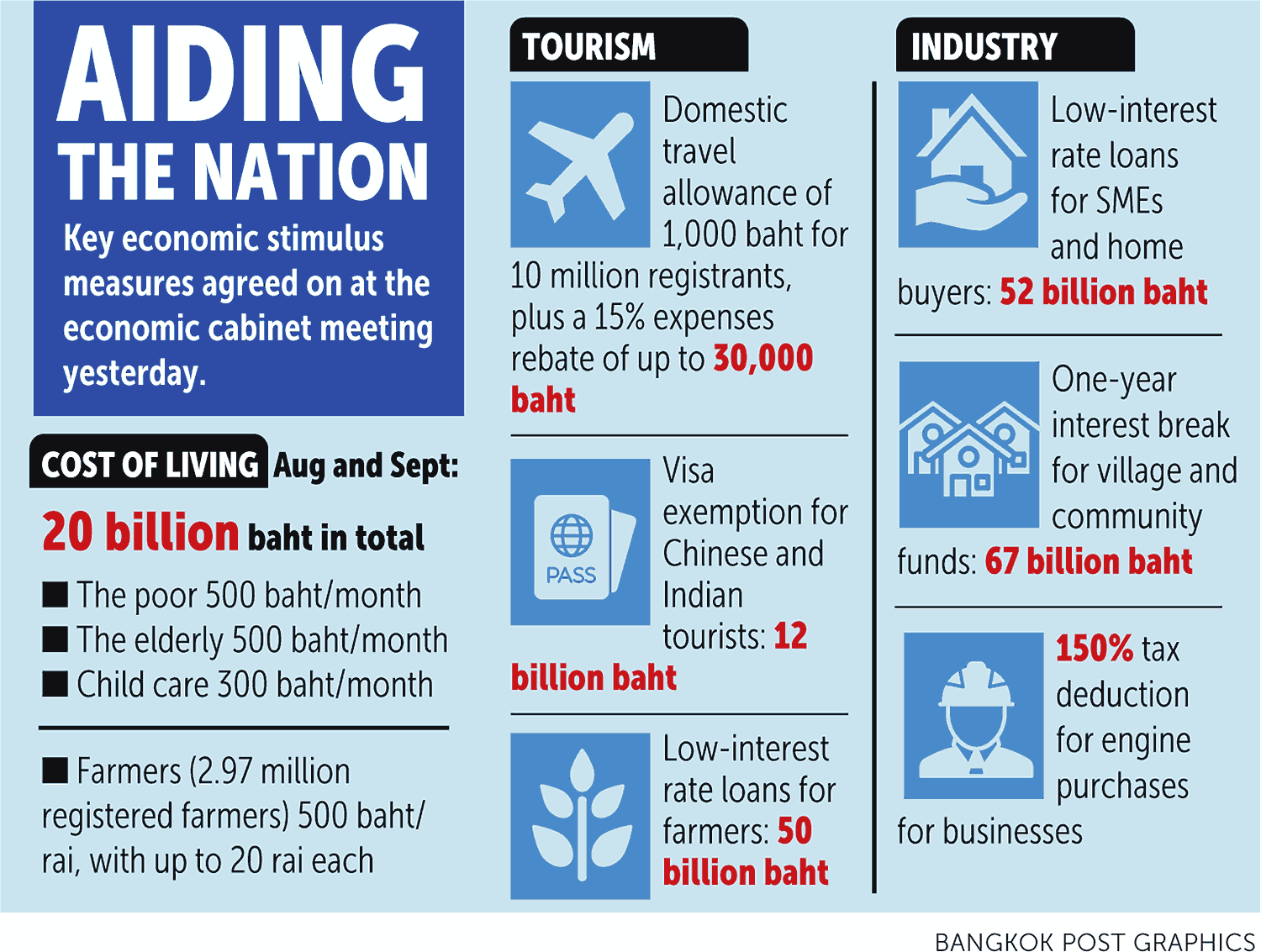
The economic cabinet has decided to inject another 316 billion baht into the economy through a new stimulus package and remains optimistic that economic growth will be more than 3% this year despite the sluggish global outlook.
The stimulus package consists of three main groups of measures: assistance for people affected by the drought crisis, efforts to mitigate the impact of the global slowdown on the Thai economy, and help for low-income earners and the elderly with the high cost of living, said Finance Minister Uttama Savanayana.
Of the total 316 billion baht, 50 billion baht will be newly allocated budget while another 50 billion will come under the government's Pracharath welfare scheme. The remaining 200 billion baht will be distributed through state banks to help ease interest and debt payment burdens for farmers and SMEs.
He was speaking after Friday's meeting of the government's economic team, better known as the economic cabinet.
The new stimulus package will next be forwarded to the main cabinet for approval on Tuesday, he said.
Cost of living targeted
The measures designed to help low-income earners and the elderly cope with their day-to-day costs of living include providing the 14.6 million holders of state welfare cards with an additional allowance of 500 baht per month this and next month, he said.
Those who receive monthly allowances for taking care of their children aged up to six will be given an additional amount of 300 baht over the same period, he said.

In total, the budget required to fund these measures will be 20 billion baht.
A group of measures to stimulate growth in the country's tourism industry will include offering Thai travellers visiting tourism destinations outside of their home provinces 1,000 baht of spending money, he said.
The cash will be distributed to eligible travellers who are at least 18 years old via the Finance Ministry's mobile application called "G-wallet", he said.
Those who are interested in this tourism promotion programme will be required to register. They will also be offered a range of benefits including a 15% cash rebate of up to 30,000 baht on their tourism spending, he said.
Another important measure to boost tourism is a proposal to offer a visa waiver to Chinese and Indian visitors that will allow them to stay in Thailand for up to 30 days, he said, adding that it is estimated that this measure will lose the government about 12.13 billion baht in annual visa fee revenue.
The measures for people affected by the drought crisis will include lowering interest rates on loans for current customers of the Bank for Agriculture and Agricultural Cooperatives (BAAC) for one year and offering them emergency loans capped at 50,000 baht each without charging them interest in the first year, he said.
As for measures designed to promote domestic investment, the government now plans to offer a 150% tax deduction privilege to businesses that purchase new machinery, he said.
Various measures to improve access by small- and medium businesses to funds and loans offered by the government and state-owned banks are also promised and it is estimated that they will cost the government about 52 billion baht, he said.
Kobsak Pootrakool, deputy secretary-general on political affairs to the prime minister, said the government's economic team now targets economic growth of 3% this year.
This is in line with the National Economic and Social Development Council's predictions which forecast growth of between 2.7% and 3.2% for this year.
A cautious welcome
Thanavath Phonvichai, vice-president for research at the University of the Thai Chamber of Commerce (UTCC), said the government economic stimulus package is designed to transfer money directly into people's pockets.
The UTCC forecasts that increased spending by those with state welfare cards, those with newborn babies, and domestic tourists could provide around a 0.2-0.3% boost to GDP growth.
The credit guarantees and housing loans provided from state financial institutions amounting to around 50-80 billion baht until the end of this year will also contribute another 0.2-0.3% to the country's GDP growth, said Mr Thanavath.
Additionally, the visa exemption plan is likely to attract around 200,000-300,000 additional foreign tourists who can be expected to inject another 15-20 billion baht into the economy, he added.
"So, the country's GDP growth may increase by around 0.5-0.7% [from earlier forecasts] this year and may guarantee the country's GDP growth will be more than 3% despite underlying negative external factors such as the US-China trade war and Brexit," said Mr Thanavath.
"If the negative factors do not hurt the global economy as predicted, then [domestic] economic growth could be as high as 3.5-3.8% this year. However, spending must be closely monitored and followed up. The results of this economic stimulus package depend on swift payments to get the money to the people," he said.
Meanwhile, tourism operators have cast doubt over whether the cash handout plan for domestic travel will distribute income to rural areas effectively since the scheme allows the money to be spent in both big and small provinces.
Originally the scheme was conceived to promote tourism in less popular second-tier provinces, and the change may not now meet the earlier objective of boosting people's incomes in small towns, said Phuriwat Limthavornrat, president of the Association of Domestic Travel.
Supawan Tanomkieatipume, president of the Thai Hotels Association, said she believed the stimulus benefits were likely to be confined to between September and November, which would not be long enough to revive the tourism sector meaningfully.